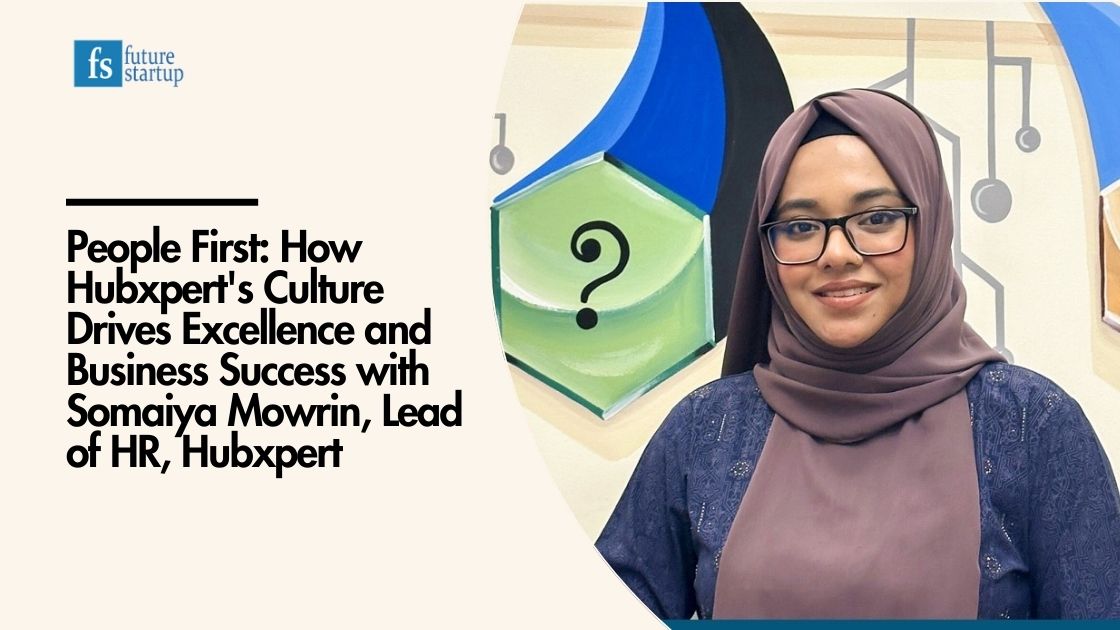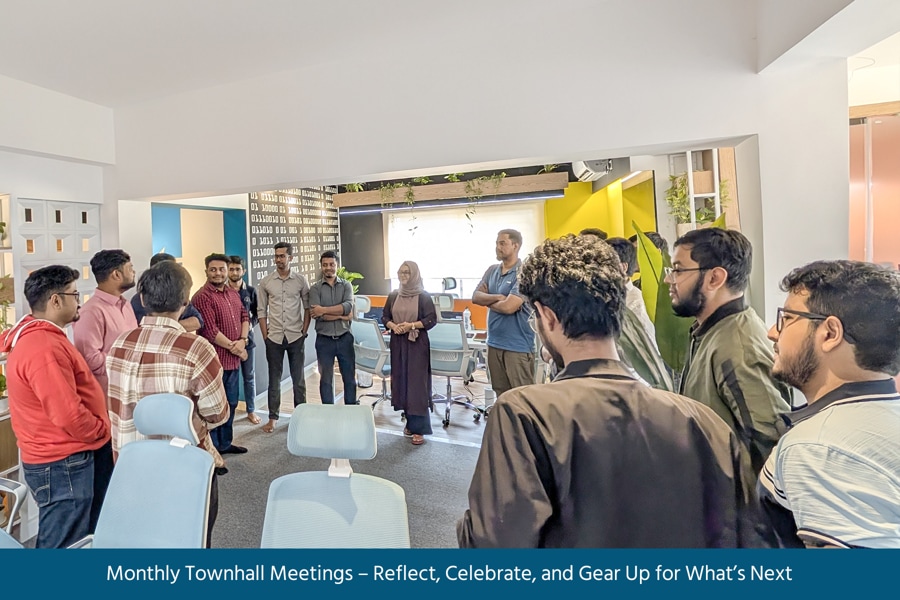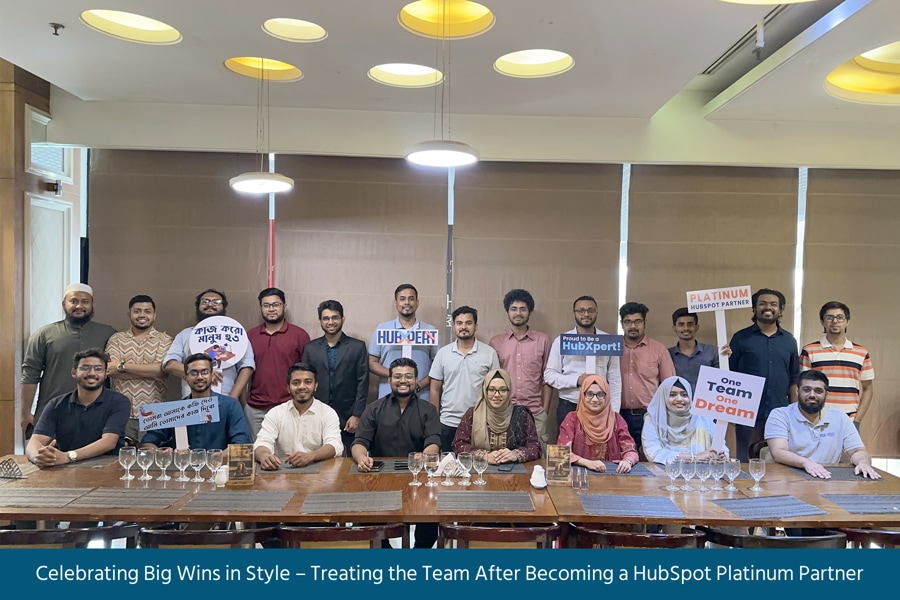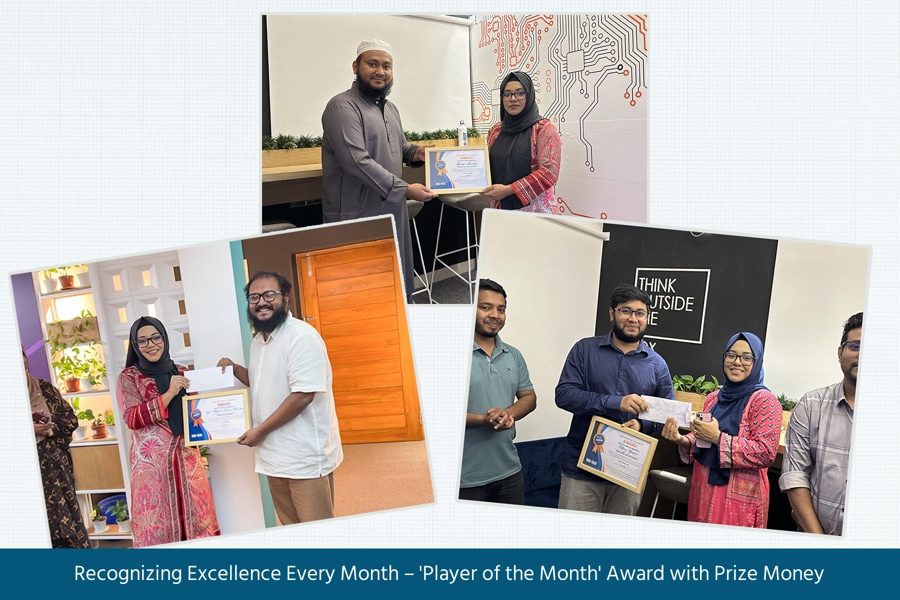
In the competitive landscape of technology and services, where talent mobility is high and the demand for skilled professionals constant, a company's culture often becomes its most valuable asset. Thus comes the adage “culture eats strategy for breakfast”. Culture is constant. It is the context in which the rest of the things happen. Strategy needs to change and adjust every now and then. It is usually the content within a context.
Hubxpert, a firm specializing in CRM and digital transformation and a HubSpot Platinum Partner serving both international and local Bangladeshi companies, appears to have internalized this principle, crafting an organizational culture aimed not just at attracting expertise but, crucially, at retaining it and ensuring consistent, high-quality output.
In this article, we take a close look at Hubxpert’s culture and how it drives the company, helping it attract and retain talents and deliver high quality work to its customers. We explore how the company thinks about culture and translates that thinking into practice, its core values, how culture empowers its people to produce high quality work, and finally, we distill critical culture building lessons that founders and operators can learn from Hubxpert’s experience.
"From the very beginning, when we were a small team of only four people, that's when decisions were made about our culture," explains Somaiya Mowrin, Lead of HR at Hubxpert.
Most companies let culture emerge organically, then struggle to correct course when toxic patterns become entrenched. Hubxpert team was intentional about the kind of company they wanted to build from day one, "a people-first company, a culture-first company” as Ms. Mowrin explains. This mantra, repeated regularly in monthly town halls and one-on-one meetings, has become an operational doctrine. Hubxpert has embedded its culture into every facet of its business model.
What makes Hubxpert's approach different is that it stems from firsthand experience with what doesn't work. The foundation of its culture was laid at inception, drawing from the founders' previous workplace experiences, both positive and negative.
"We tried not to repeat the things we faced," Ms. Mowrin recounts, citing examples of discrimination, salary inequity, and toxic environments. Instead, the company focused on building a culture “on collaboration, creativity, and a strong sense of community”. “We prioritize the well-being of our team and ensure that everyone feels valued and supported,” explains Ratul Rahman, CEO of Hubxpert. “This focus on people and quality is what drives us as an organization.”
What emerged was a deliberate focus on creating an environment where people "feel comfortable working”, addressing fundamental human needs: psychological safety, respect, transparency, and growth opportunities.
Hubxpert's culture rests on several foundational elements that potential candidates, clients, and other founders should note.
Hubxpert's hiring process reflects its cultural priorities. Unlike conventional approaches that often prioritize technical skills, its recruitment process places equal, if not greater, emphasis on cultural fit. The process follows a structured path: screening, phone call, culture round, technical assessment, and final interview. ‘Cultural fitness round’, handled by the HR lead and team, is placed immediately after the initial screening. This sequence is deliberate and highly prioritized. The round explores candidates' motivations, previous workplace experiences, and responses to hypothetical scenarios that test communication skills and values alignment.
The underlying philosophy is that while technical skills can be acquired and honed over time, a person's core cultural beliefs and disposition are far more intrinsic.
As Ms. Mowrin notes, "a good person will learn the work in the future," but a poor cultural fit can undermine the entire team's efficacy and well-being.
Hubxpert states that cultural fit is never sacrificed. While technical soundness levels (categorized from 1 to 3) can vary depending on the seniority of the role being hired for, cultural fit must always meet the highest standard (Category 3).
"If we are looking for an intern or junior, then meeting just the first category is enough technically. But culturally, you have to be the third category always, there is no exception," Ms. Mowrin states, revealing a recruitment algorithm that prizes cultural congruence as a non-negotiable factor.
The hiring process is thus designed to screen out individuals who might disrupt Hubxpert’s stated goal of creating a "safe and secure workplace for everyone (female and male) where there is no bullying or criticism based on looks, colour, qualification, or education". This commitment is rooted in the belief that experts perform optimally only when they feel "comfortable and safe" in their environment.
The assessment of cultural fit goes beyond superficial impressions. Hubxpert employs a manually developed checklist, refined through experience, to identify key traits. Candidates are evaluated on their willingness to learn, patience, confidence without being overconfident, and respect. Candidates must demonstrate genuine curiosity and willingness to develop. Since Hubxpert works with specialized technology such as Hubspot that has a learning curve; impatience is a disqualifier. Similarly, how candidates express needs and concerns matters equally.
Practical indicators are scrutinised; for instance, how a candidate speaks about previous employers. Negative commentary is viewed as a warning sign.
The process includes scenario-based questions, approved by department leads, exploring how candidates would navigate interpersonal dynamics, such as working with a younger lead or handling disagreements.
Even the mandatory module tasks given before the technical round serve a cultural purpose, testing a candidate's learning attitude versus a tendency to deliver ready-made solutions.
This rigorous approach is seen as critical to maintaining a good retention rate, which HR views as critical given the cost of losing skilled personnel and the ongoing investment in training.
The careful cultivation continues after hiring. New joiners receive welcome gifts, a comprehensive handbook, and structured introductions to team members.
Training modules are customized to individual learning paces, with a grace period of up to three months for mastering the company's specialized technologies.
"The first month just goes in training," Ms. Mowrin explains, acknowledging the learning curve of HubSpot specialization. This investment in gradual, thorough onboarding pays dividends in employee competence and commitment.
Social integration is equally prioritized. Team leads and old colleagues intentionally include newcomers in coffee breaks and decision-making opportunities. "Bhaiyya, you decide what color it will be," they might say to a new team member, creating opportunities for engagement and ownership.
This careful orchestration of both technical and social integration creates a foundation for long-term employee success and satisfaction, a critical factor for both talent retention and consistent client service delivery.
Hubxpert personalized experiences for each new hire within a systematic framework. This personalization extends to how the company motivates team members. As Ms. Mowrin explains: "It's not possible to keep everyone the same with the same therapy. We are all different." This nuanced understanding that different team members need different types of support is rare in organizations of any size, but particularly remarkable in a growing company.
Apart from receiving welcome packages tailored to their preferences, employees are allowed to work remotely if needed. Monthly one-on-ones with HR, leads, and the CEO ensure individual needs are heard.
While culture forms the cornerstone of Hubxpert's approach, the company remains pragmatic about market realities. Understanding that finances remain a primary concern for professionals, Hubxpert positions its compensation strategy deliberately. Financial compensation is addressed through market research to ensure salaries enable a good living standard for employees and their families, aiming for a competitive edge.
"We research our market well," Ms. Mowrin notes. The company calibrates salaries to exceed market averages by 5,000-10,000 taka, ensuring employees can "live well with their family." This financial commitment extends beyond base salary to include project bonuses, performance rewards, and celebratory bonuses for life events.
Salaries are paid punctually, often by the 1st of every month. In many cases, salaries are processed earlier—on the 30th or 31st of the current month. Project bonuses are distributed monthly based on contribution to revenue, alongside festival, performance, and potential wedding/paternity bonuses.
However, non-financial motivation, such as leadership check-ins and feeling valued, is considered equally, if not more, impactful.
The office environment is designed to be more than just a workspace, featuring unlimited snacks, coffee, and recreational facilities, reflecting a philosophy that work should also be enjoyable. Team activities, from diners and go-karting to sponsored tours (including family members) and weekly football tournaments, further cultivate camaraderie and provide breaks.
Recognitions are given through "Best Performer" awards.
Many startups either underpay and over-promise or focus exclusively on salary while neglecting other aspects of compensation. Hubxpert takes a different approach. The company benchmarks salaries against what would allow employees to "live well with their family" in the local market. It often starts slightly below a candidate's target but ensures they reach it within three months of becoming permanent. Project-based bonuses create direct links between contribution and compensation. Finally, recognition programs like Performer of the Month provide social validation.

Hubxpert cultivates an environment designed for long-term engagement. Communication is intentionally structured to support both in-office and remote work.
The company primarily uses Slack, deliberately favouring typing over immediate in-person discussions to ensure remote colleagues are not disadvantaged. For issues requiring deeper engagement, dedicated meeting rooms are available for in-person discussion.
The physical office space is also personalised, with efforts made to provide customised items like tea mugs for individual team members, reinforcing the idea that "you are not like everyone else, you are important".
The company appears particularly attuned to the needs of its workforce, demonstrating significant flexibility. The option to work from home is a major benefit for those with young children or elderly parents, allowing them to be present at home while remaining productive.
Supporting remote employees extends to practical assistance. Post-COVID-19, Hubxpert has become adept at managing the challenges of individual remote work, preparing for issues like connectivity problems or equipment failure, even offering immediate financial help if needed.
Employee gift packages are consciously designed to be useful in both home and office settings, including items like good coffee, candles, earphones, or speakers.
"Most of our people are family persons. They have wives or young babies or a baby is expected. Staying at home is important for these people. Many of our teammates are of the age when it is almost time that their parents would get sick. Working from home, being close to parents and being able to check on them in the middle of the day, these things are important for them", explains Ms. Mowrin.
For tech professionals in Bangladesh, where commutes can be brutal and family responsibilities significant, these policies address practical needs.
What truly distinguishes Hubxpert's culture, however, is its attention to factors beyond monetary compensation. The company has crafted a work experience addressing multiple dimensions of employee well-being:
Flexibility and understanding. The company demonstrated this when allowing an employee in probation to work remotely for 2.5 months while caring for a paralyzed mother. This compassionate accommodation builds loyalty that transcends transactional employment relationships.
Regular communication and recognition. Monthly town halls, performer-of-the-month awards, and coffee sessions with the CEO ensure visibility and appreciation for contributions at all levels.
Professional development and growth. Hubxpert invests in the continuous growth and development of its team members. Given that Hubspot is new to most recruits, an initial training period of two to three months is typical. The company has in-house training modules and assess progress to ensure preparedness for subsequent stages.
Leadership and HR maintain consistent connection with employees through regular one-to-one meetings (monthly, mid-month, or weekly). These sessions cover future plans, work progress, and expectations, and provide a platform for employees to voice problems, sometimes simply needing to be heard.
Performance is formally reviewed monthly, with a summary evaluation every six months to assess growth and development against goals. Discussions during six-month check-ins address career growth, learning needs, and future aspirations within the company.
The nature of its work, involving cross-departmental projects and new clients every few months, provides inherent opportunities for continuous learning and mitigates boredom, particularly for delivery teams.
Team bonding. Regular activities like football tournaments, day trips, and sponsored tours (with partial funding for spouses and children) foster relationships beyond work.

For potential clients and partners, Hubxpert posits that this carefully cultivated culture directly translates into high-quality service delivery.
A motivated, well-supported team, grounded in a safe and respectful environment, is more likely to produce exceptional work.
Its internal processes, including detailed scoping, dedicated teams, clear roles within projects, and internal deadlines, are designed to ensure efficient and high-quality output. The company's structure, with integrated teams covering sales, marketing, development, design, and integration, provides a comprehensive service package under one roof, differentiating it from competitors who may specialize in only one area.
Hubxpert's focus on employee well-being and clear internal guidelines aims to mitigate potential disruptions to project quality.
For potential clients, Hubxpert's cultural foundations translate to several concrete advantages:
Reduced Knowledge Gaps: The company's employee retention success (only two departures in its history) means clients don't face the common problem of knowledge walking out the door mid-project. The institutional memory stays intact, allowing for deeper understanding of client needs over time.
Cross-Functional Collaboration: Hubxpert's deliberate approach to interdepartmental work creates seamless project execution. The company has built a cross departmental collaborative culture. This integrated approach allows it to deliver end-to-end services rather than siloed expertise—critical for Hubspot implementation where marketing automation, sales processes, and technical integration must work in concert.
Time Zone Advantage: For international clients, Hubxpert's location creates a productivity advantage. "Since when they are resting, it is our working hour. While they are returning to work, our team is keeping the work ready. So, the next day, they are doing the work again."This time difference, combined with consistent delivery, makes them particularly valuable to American clients who wake up to completed work.
Deep Preparation: The company has built a meticulous approach to work where each client's work begins with thorough research. "When someone books a call on our website, that is the first call for scoping, which is about how our software is needed for their business. So, our team members who give the demo presentation take one day to understand their company." This preparation, facilitated by a stable team that's not rushing between opportunities, enables more targeted solutions.

For entrepreneurs and company builders, Hubxpert's approach offer several transferable lessons:
Invest early in culture. "From the very beginning, when you have a small nucleus, that's when decisions are made about our culture," Ms. Mowrin observes. The most critical cultural investments happen early. This principle applies whether you're founding a company or establishing a new team within a larger organization. The effort required to shift culture grows exponentially as the organization scales.
Balance idealism with pragmatism. While unwavering on cultural values, Hubxpert remains realistic about market demands, offering competitive compensation and understanding the practical needs of its workforce.
Systematize the intangible. Cultural values are operationalized through structured processes, from recruitment checklists to performance evaluations, making abstract principles concrete.
Define culture concretely. Vague statements about "respect" and "teamwork" don't guide decisions. Hubxpert's approach of creating specific checklists for cultural attributes turns abstract values into practical tools.
Establish clear anti-patterns: Hubxpert is explicit about behaviors it won't tolerate: "Office politics is a very, very serious challenge. Particularly if you want to maintain a healthy culture." The company actively discourages grouping, favoritism, and gift-giving to superiors, behaviors that can undermine meritocracy. By naming these anti-patterns, the company makes them easier to identify and address before they take root.
No cultural model is perfect, and Hubxpert is still navigating certain challenges.
With approximately 25 employees, Hubxpert’s high-touch approach to culture will face scaling challenges. Many of its practices rely on the direct involvement of founders and leadership, coffee sessions with the CEO, HR one-on-ones with Ms. Mowrin. Maintaining this level of engagement as the company grows will require structural innovation.
Despite the challenges, the outcome of Hubxpert's cultural investment is clear. "So, till now, those who are working with us, who have had the opportunity to work for a long time. Everyone, more or less, appreciates one thing, that 'It's like a second home'," explains Mr. Mowrin. This sentiment, rare in any industry, particularly tech, reflects what deliberate cultural design can achieve.
What's most instructive about Hubxpert's approach isn't any single policy or practice, but the recognition that culture requires the same intentional design as products, services, or business models.
For other organisations, Hubxpert's journey offers several key takeaways in building a thriving culture.
Learning from past experiences to identify what makes employees feel safe and valued is paramount. Prioritising honesty and transparency with employees, particularly regarding promotions, permanent status, and performance feedback, builds trust and avoids harmful "politics" or "grouping". Avoiding favouritism and ensuring recognition is based on genuine contribution rather than visibility is also crucial.
The commitment to continuous learning and providing opportunities for growth is essential for retaining ambitious talent.
Finally, while financial compensation is important, addressing the basic needs and providing strong non-financial motivation through leadership engagement and a supportive environment are vital pillars of a great culture.
In sum, Hubxpert presents a case study in leveraging organisational culture as a strategic tool. By meticulously focusing on cultural fit in hiring, creating a supportive and flexible work environment, investing in continuous learning and growth, and providing both financial and non-financial motivation, the company aims to build a stable, motivated team capable of delivering high-quality services.
This approach, Hubxpert contend, makes it a compelling proposition for talented individuals seeking a fulfilling career, clients in search of reliable expertise, and other businesses looking to understand the levers of successful organisational design.
